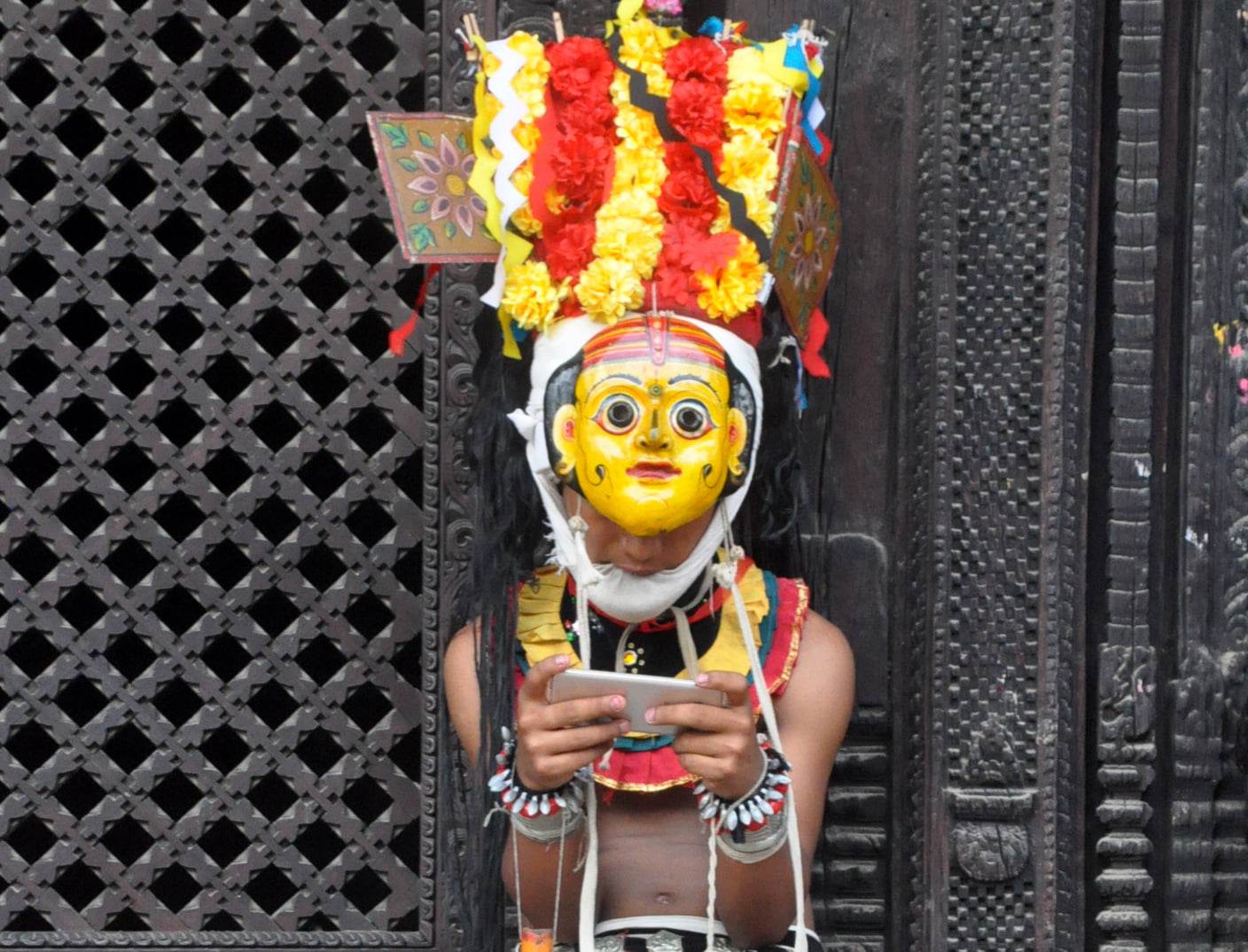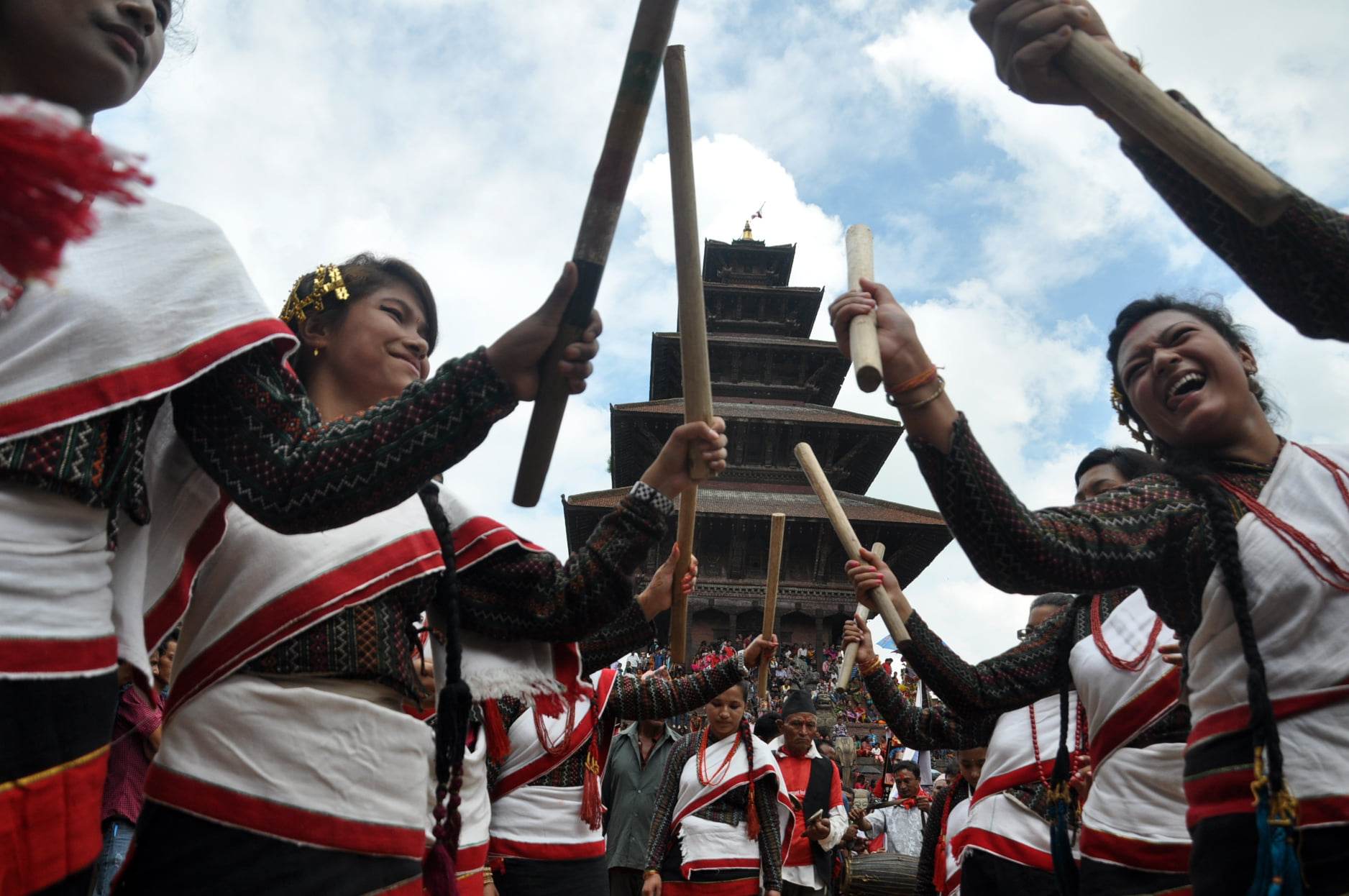Bhaktapur Municipality has set a new model of development by blending tradition with innovation for vibrant growth.
With the end of Biska Jatra, the Bhairab Rath of Bhaktapur has been garaged for this year. However, the chariot of development continues to parade in the Island of Goodness, Bhaktapur Municipality. The new development practices initiated by the municipality have made the ancient city of Lichhavi era more vibrant. In contrast to other municipalities in the country, Bhaktapur Municipality has charted a unique path towards development symbolized by the moving-forward chariot of Bisket.
When it comes to building a great city, it's not only the ancient culture and art that matter, but also the innovative development practices introduced by the people's representatives. Bhaktapur Municipality has managed to set itself apart from other cities in the country by blending traditional knowledge with modern education. What's more, the city has demonstrated remarkable resilience, managing to work quickly even in the face of adversity.
Legend has it that the eight goddesses of Ashta Matrika protected the old city of Bhaktapur. Today, as a city rich in heritage and culture, Bhaktapur has a newfound appreciation for its ten wards, each led by a dedicated representative who works to represent the entire city. Thanks to his hard work and unwavering commitment, the municipality has achieved its objectives and more.

The leadership of Mayor Sunil Prajapati is equally important in this good deed of Bhaktapur Municipality. In particular, he himself considers all these works to be the result of the collective support of the townspeople. "We have taken a step forward with the common sense of the citizens," said Mayor Prajapati, “A crowd that is ready to push the chariot of development was formed.”
To achieve success, the city believes that it doesn't need to do new things, but rather do things differently. This is why Bhaktapur Municipality has prioritized working on small things that other cities have ignored. As a result, the people are even more pleased with the work being done by Bhaktapur Municipality.
Not only a hospital is built here for the unhealthy, but also a gymnasium has been arranged in public places to stay healthy. Under the door-to-door nursing service, nurses conduct health check-ups at home. Elderly people do not need to go to the bank to get old age allowances; instead the bank comes to their yard. "In other cities, senior citizens have to go to the bank for these allowances," says Sunil Prajapati, “It has been five years since other cities have practiced federalism, but this city has been using the rights of the local level for a long time.” By spending its own income, the city has progressed as an independent entity without relying on the central government for development.
The primary source of income for Bhaktapur is tourism, and the city has fully utilized this revenue to fund its development. Even during the Covid-19 pandemic, when tourists were scarce, the city continued to develop through public donations and other sources of income.
During the lockdown, when the employees of other cities were resting, this city took special care of the health condition of the residents by deploying all its employees in the field. Due to the significant work done in the fight against Covid-19, this city was also honored by the Bagmati province government. "During the pandemic, our need for people was even greater," says Mayor Prajapati, "Which is why we took risks to keep our citizens safe.”
Bhaktapur Municipality has made remarkable progress in various fields, particularly in education, health, and heritage sectors. As a city rich in ancient civilization, Bhaktapur has made significant strides in multifaceted development, blowing the trumpet of progress in the ancient city of art and culture.
PM Oli holds discussion with chief minister and ministers of Lu...

Education
Bhaktapur Municipality has established a reputation for providing affordable higher education to students across the country, with the operation of eight educational institutions, including two engineering colleges. This year, the city has expanded its offerings with Purbanchal University granting permission to operate the ‘Khwopa College of Law’. At present, approximately 7,000 students from 72 districts are enrolled in these institutions.
The city's commitment to providing quality education has resulted in its being known as an engineering hub, producing 432 engineers annually. Additionally, female graduates and post-graduates are increasingly visible in the city's social fabric. Mayor Prajapati notes that the educational institutions, founded with the objective of providing low-cost higher education to the children of common people, are providing a pathway for the new generation to meet new challenges while developing respect for labor through the integration of education with productive work.
Moreover, the city has established childcare centers in different wards, providing vital support to single parents by enabling them to confidently enter the workforce, knowing their children are well cared for. Though some students may need to venture outside Bhaktapur for further education, the city provides financial assistance through scholarships, allowing them to pursue their higher studies in diverse subjects.

Health
After various struggles, the municipality got permission from the Bagmati government on May 6, 2022 to build a 100-bed hospital. It has provided health services to 16,426 patients from 60 districts, including Bhaktapur, in a period of six months in 2022. The city is planning to make the hospital even better. All the preparations are being completed for this.
Similarly, Nepal's first and only respiratory/chronic center has been put into operation in Bhaktapur Municipality. The center has been established in Tumucho Dugure, Bhaktapur Municipality-9. As the number of chronically ill patients is increasing day by day in Nepal, the hospital has established a rehabilitation center to reduce the number of patients.
The municipality has been providing 24-hour services to the citizens through public health centers in Chyamasingh and Byasi. In the same way, in 2006, the municipality in collaboration with the Tilganga Eye Institute has launched the District Community Eye Center. In collaboration with the Ayurvedic Center, the municipality has launched Ayurvedic treatment services.
Not only hospital services but also nursing services are provided to the patients at their doorsteps for their proper health. This service, which started in 2017, involves preparing family health information, taking care of the disabled and elderly, health examination of pregnant mothers, counseling and referral to health institutions as needed. For this, one nurse and one health volunteer are deployed in each ward of the city.

Cultural heritage
Bhaktapur, a city devastated by the 2015 earthquake, is making a remarkable recovery. The municipality has successfully rebuilt 26 temples, 42 Patis, eight Dyochhe-Devghar, and four entrances that were damaged in the earthquake, in addition to restoring 11 ponds, seven wells, eight satals, and seven stone spouts. The city has managed to do so without compromising its heritage value or losing its originality. Mayor Sunil Prajapati expresses his pride in the restoration and reconstruction work, which has been accomplished with the help of local citizens and experts in traditional skills, rather than relying on foreign assistance. He says, "Rather than being happy with the heritage built by asking for foreign assistance, we are proud of the heritage that has been restored and reconstructed in our own generation. That is why the city could not accept the agreement of 10 million euros between the Nepal and German governments as it was not in their interest."
Bhaktapur Municipality has taken steps to ensure that the younger generation learns traditional skills by respecting and learning from senior citizens who have such knowledge. The city's carpenters and engineers, trained in the district, are contributing to the reconstruction work, and neighboring districts are benefiting from the skills of the locals. Bhaktapur women have also played a significant role in the reconstruction of the famous Ranipokhari in Kathmandu.
The municipality's major source of income is the fees collected from tourists who visit the city. This revenue has been used to support education, health, and heritage conservation. Although the lockdown has resulted in a decrease in tourist numbers and income, the enthusiasm of the townspeople for heritage preservation has ensured that reconstruction work continues. Bhaktapur city has also implemented strict building standards for private and new houses to preserve the traditional form. When building private housing within the World Heritage and Cultural Area, the city subsidizes 35 percent of the building’s front part construction cost. The city has launched a campaign to build houses in the traditional way.
The ban on pitching on inner roads in the city area was just the beginning of Bhaktapur's efforts to enhance its aesthetics. As the brick-laid roads began to accumulate dirt, the municipality replaced them with stones, further adding to the city's charm.
Moreover, the municipality has made significant strides in preserving the region's art and culture, adhering to the ancient adage that proclaims our cultural heritage as our greatest wealth. To this end, various cultural preservation competitions are organized annually, and the local curriculum now includes "Identity of Khwopa," which sheds light on traditional folk music and folk dances. This provides the younger generation with an opportunity to learn about these fading traditions.
Cultural expert TejeshwarBabuGwanga notes that the municipality has taken particular care to preserve both tangible and intangible art, including festivals, original lifestyles, rituals, Dafa hymns, Guthi, folk music and folk dance. "Bhaktapur remains the original city of Nepal, thanks to its commitment to preserving its art, culture, and heritage," he asserts. Those who safeguard Bhaktapur's legacy and invest in the future of its youth are invaluable. The municipality hopes that the youth will take an active interest in local traditions, such as the Jatra, drumming in Tolls, and pulling the chariot's rope, all of which not only preserve the culture but also keep it alive.
Employment
This city, which is also famous for farming, has recently faced an agricultural crisis with increasing urbanization. However, the municipality has been proactive in finding alternative income sources for its citizens. To this end, it has provided guide training and language instruction in Chinese, targeting the city's youth to cater to the growing tourism sector.
Furthermore, the municipality has been offering training in diverse trades such as carpentry, photography, plumbing, and electricity, enabling young individuals to develop valuable skills. Consequently, traditional construction work faces no shortage of skilled carpenters and artisans, while language proficiency has enhanced communication with visitors, boosting the hospitality industry.
According to Mayor Prajapati, "The city is now self-sustaining, and owes its success to the collective efforts of its residents." The culinary education programs have helped to revitalize the hotel and restaurant business, and the city is thriving as a result. Despite the agricultural crisis, the city has found a way to stand on its own and create a brighter future for its citizens.
Religious harmony

For centuries, Buddhists and Hindus in Bhaktapur have shared a deep affection for one another, a testament to the region's religious harmony. Chaityas and temples standing side-by-side convey a message of mutual brotherhood that is embraced by both communities. Remarkably, this peaceful coexistence is not limited to these two groups, but extends to all religious sects in the area. It is a common sight to see people from diverse faiths engaged in conversation in various parts of the city, a testament to their shared sense of community.
Furthermore, the municipality has been proactive in facilitating community events and festivals, ensuring that every religious group is represented and supported. These efforts have helped to promote greater understanding and solidarity amongst the different groups, ultimately contributing to a peaceful and harmonious society.
While Bhaktapur's main gate provides a stunning view of the region's unique development and progress, it is the communal spirit within the city that truly captures its essence. Indeed, it is this spirit of unity and cooperation that makes Bhaktapur a truly special place.










_20240808104125.jpeg)
























